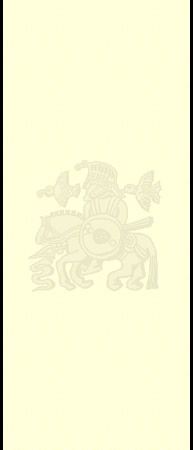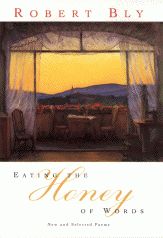



| Web site design and maintenance by Akikaze Media Services. All content of this site, unless otherwise noted, is copyright ©2001 Robert Bly. All Rights Reserved. Any duplication, in any form without the written consent of the copyright holder is prohibited. |

By Thomas R. Smith
At 200 poems, Eating the Honey of Words far outstrips in size and
scope Robert Bly’s earlier Selected Poems (1986), drawing extensively
on the subsequent collections Meditations on the Insatiable Soul and Morning
Poems.
Eating the Honey of Words contains at least 30 poems, both old and new, never
before published in one of Bly’s major volumes. Add to these the more or
less familiar poems now retitled and/or radically revised, and there are many
discoveries awaiting even those deeply familiar with Bly’s opus.
For purposes of this discussion, I’ll examine Eating the Honey of Words
primarily by way of these new or drastically reworked poems, rather than recapitulate
the merits of more stable favorites.
One of the most striking aspects of this book is the clear sense of purpose with
which Bly states lifelong preoccupations in his earliest, least-known efforts.
Take for example the fierce, haunting and wholly realized "A Poem for the
Drunkard President." In this formative poem we can glimpse, already highly
developed, Bly’s quasi-surrealistic collaging of historical images, a technique
which found its fullest expression in the 1968 National Book Award winner The
Light Around the Body:Little Crow died with skunk-fur bands on his wrists.
Long Head charged the rifles naked. Some men
Taunted the Algonquins while tied to the stake.
Others died on high scaffolds in Texas. . . .
This deserving poem, which apparently fell between the cracks of Bly’s other collections, rightfully takes a place among his best. "Drunkard President" taps a vein of Scandinavian fatalism that continues to flow freely throughout the poet’s mature production:
All the old singing says it: It will all
End in ashes. The kept life is the lost life.
It is still true. What moves us in our tents?
The spectacle of Grant, lying drunk, in the rain.
With the notable exception of Sleepers Joining Hands (1973), represented
here only by a newly pruned version of the long anti-war poem, "The Teeth Mother
Naked at Last," Eating the Honey of Words amply highlights each period of
Bly’s poetry: Sufi-inspired prose poems of This Body Is Made of Camphor
and Gopherwood (inexplicably excluded from the first Selected Poems); poems anatomizing
the wounds inflicted and sustained by fathers and sons in The Man in
the Black Coat Turns; the imagistically inventive lyrics of Loving
a Woman in Two World;
emotionally stark poems grappling with Bly’s father’s old age
and death in Meditations on the Insatiable Soul; and the serious play of
the Morning
Poems.
In Bly’s Jung-dominated middle period of around 1970-1985, the hand of
revision falls most heavily, perhaps because the conceptual ground itself of
these poems invites continual revision. Often while reading these new versions,
we sense Bly revising at least as much for content as for poetic value. Thus "Galloping
Horses," a single-paragraph prose poem from This Body Is Made of
Camphor and Gopherwood (1977) becomes in 1999 the page-and-a-half long "Four Adventures
of the Soul." Here are the respective opening sentences:
The horses gallop east, over the steppes, each with its rider, hard. (1977)
Let’s imagine that the soul is made up of twenty horses and their riders. (1999)
Some readers may prefer, as I do, the original, less explanatory version,
believing with Coleridge that poetry is best when it is generally though
not perfectly
understood.
But more often than not, the reader benefits from Bly’s risk-taking. While
many poets consider the published poem a closed matter, for Bly a poem is obviously
a conversation—between the poet and a mentor, or a political or religious
idea, or even language itself—that may continue long after the poem has
achieved the relative fixity of print. Bly has also dramatically rewritten, in
this case for the better, a suite of poems on his father’s death from
Meditations on the Insatiable Soul (1994). Here are two versions of the final
stanza of a
newly retitled poem in which Bly dreams that his father has hanged himself:
I cried out to my wife,
" He didn’t die
That way!" The man who threw
The body said, "It’s over. You
Don’t have to
Rescue him again."
("A Dream of the Blacksmith’s Room," 1994)
The revision in Eating the Honey of Words departs from the earlier version in
having the author wake from the dream at the end of the poem:
I woke and cried to my wife:
" He didn’t die
That way! There was no rope!
All that is wrong!" She
Said, "In
Your dream he did."
("A Week After Your Death," 1999)
Besides being clearer and less convoluted, the 1999 version demonstrates a new willingness not to impose interpretation, but rather to leave the harsh mystery of the dream intact. That Bly has chosen to reprint here over 40 poems from his recent collection, Morning Poems, indicates a continuing closeness to them. In the context of Eating the Honey of Words, they’re a little like watching a flamenco master reinvent himself as a ballroom dancer. The teasingly slender selection of new poems from the past two years mainly extend their method and idiom. The book’s final poem, "The Donkey’s Ear," bodes auspiciously for the poetry Bly has yet to write:
I’ve been talking into the ear of a donkey.
I have so much to say, and the donkey can’t wait
To feel my breath stirring the immense oats
Of his ears. . . .
Eating the Honey of Words vividly demonstrates that Bly has made a career
of refusing to repeat himself, of upsetting expectations, of taking the road "less
travelled by," and of rejecting the conventional and the predictable.
Navigating this rich and varied collection, one must admire the consistency with
which Bly has remained faithful to spiritual and psychological depth in his poetry.
He has proven one of our most durable, surprising, and hard-working poets, and
the poems in Eating the Honey of Words constitute the vital harvest of his labors.
Anyone wishing to experience the strongest and deepest currents of contemporary
American poetry will need to know them.
– Reprinted from Great River Review, Fall/Winter 2000-2001